Graham Reid | | 10 min read
The High Road to Jodhpur/Am Bothan a Bh'aig Fionnghuala
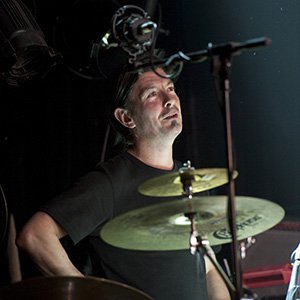
Percussionist James Mackintosh sees the irony. When he was a teenager growing up in the picturesque Scottish Highlands at Fort William he was in a spiky-haired punk band playing Clash covers.
It was only when he went to the big smoke of Edinburgh – once nicknamed Auld Reekie for the smoke from coal fires – that he started to play traditional Scottish music.
These days, some 30 years on from busking in Scotland's capital, he remains a member of the band he co-founded with fiddle player Angus R Grant which has bridged the gap between traditional and contemporary, Shooglenifty.
But the much travelled band – which plays a New Zealand tour this month, see details below and introduces a new pint-sized fireball fiddle player Eilidh Shaw to Aotearoa audiences – have done more than that.
Over a series of albums and concerts they have collaborated with artists from numerous styles and cultures, most recently with the Master Musicians of Rajasthan.
Their energetic shows have endeared them to audiences at traditional festivals in the Highlands to Womad crowds around the world.
And for Mackintosh – who now lives in the Scottish Borders near Peebles, an hour south of Edinburgh with his wife and Shooglenifty singer Kaela Rowan, formerly of Mouth Music – it all began when he was a young punk in the Eighties.
You were a child of the Eighties as a teenager, listening to pop and rock like everyone else.
Yes, I went to college in '86 and I'm 50 this year, so a teenager of the Eighties as you say. Me and my pals got into this little band and were like the punks of the school. We cleaned all the horse manure out an old barn that belonged to one of the band in Glen Nevis and we rehearsed in there for a couple of winters and summers. It was right at the foot of the Ben Nevis [Britain's highest mountain].
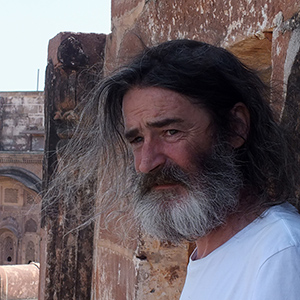 I learned my craft playing on
Tupperware and pots'n'pans and then joined this band and managed to
acquire a drum kit thanks to my good mother. I learned by playing
Clash songs and punk tunes.
I learned my craft playing on
Tupperware and pots'n'pans and then joined this band and managed to
acquire a drum kit thanks to my good mother. I learned by playing
Clash songs and punk tunes.
It was not until I met my friend [fiddle player] Angus and started busking that I got into the traditional stuff, and at that time I was in Edinburgh in art college.
So it wasn't until I moved out of the Highlands and got down to Edinburgh that I started playing those tunes. But originally we were just spiky-haired punks.
And you liked [Scottish band] Big Country of course?
I did like Big Country but was more into the Skids who were predecessors of Big Country. Richard Jobson was in the Skids, they were a great band. His daughter [Edieline] is actually doing really well these days, she's a great singer.
You see the irony of a punk in a small town and then traditional in a big town?
Well yes, but traditional-ish. Me and Angus did a lot of busking but that was long before Shooglenifty gathered together. We got together around a table in a bar and ended up in a regular spot in a nightclub and were being influenced by all sorts of contemporary music. The dance thing was kicking off and we were out at clubs and that all fed into it as well when Shooglenifty formed in the darks of the Grassmarket area in Edinburgh.
I know that area, I saw the ugliest prostitute in the world in the Grassmarket back in the day. Those were the days.
Oh, you've lived then (laughs)
I guess there was no compromise in terms of two different styles, you saw them as natural corollaries . . . because at some level much traditional music is also dance music?
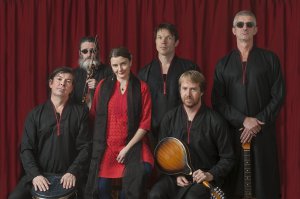 Absolutely. As long as it has integrity
I have no problem with any kind of music. It felt at the time that
there was a great scene – and there still is – of young,
innovative traditional bands. We were very lucky to be in the
vanguard of a certain kind of blossoming.
Absolutely. As long as it has integrity
I have no problem with any kind of music. It felt at the time that
there was a great scene – and there still is – of young,
innovative traditional bands. We were very lucky to be in the
vanguard of a certain kind of blossoming.
There are so many great bands today doing very experimental things but we were seen at the time [in the late Eighties and early Nineties] as fairly left-field, but we were given great opportunities and because we were in that vanguard we managed to make a splash quite quickly. And we started doing Womad festivals and various tours and recordings.
We were very quickly signed up to a small Scottish traditional label and I think they had a few misgivings but when the album [Venus in Tweeds] came out it became their top-selling record of the roster and remained there for a few years.
You did arrive at a good time in that the Peter Gabriel/Womad thing was kicking off. I remember speaking with Philip Glass at that time who said it wasn't about crossover music but crossover audiences, because people were becoming more open to new ideas.
That's true. I'm a fan of him, I was listening to his memoirs read on Radio 4, about him being a taxi-driver in New York in his early years. That is the thing . . . I remember being in Australia on a Womad tour many years ago and going to meet our Australian record company representative in Sydney.
The first question he asked was, 'How do we categorise you lot?' And he brought out a Shooglenifty album, a Martin Bennet album and someone else, maybe the Beatbox Fairies, and said, 'Where do we put you in the shop? Do we put you under Folk or Dance?'
I said we weren't bothered really, just put us wherever. People love categories but those barriers are falling away to a great extent.
We've just come through the Celtic Connections Festival in Glasgow, and go on-line and have a look at who was there because it was everything from traditional tribal Indian music to West African, North African, roots Americana, Canadian, classical . . .
It's a folk festival but a very broad thing.
I spoke to the late Bob Brozman, the American guitarist, and he said he had no problem playing with musicians from anywhere in the world as long as they were on about the same latitude, because that is how music has moved. Not north to south but around the world. And Shooglenifty have done that.
Yes. I watched a video today of some female Mongolian jaw-harp players and it was amazing and I wrote to our mandolin player [Ewan MacPherson] and said these women could just as easily be from Rajasthan with some of the things they are playing. There is a beautiful tradition of jaw-harp in North India as well, and there used to be in Scotland too. Every family had a jaw-harp and harmonica tucked away somewhere.
Before the iPad and the upright piano even.
So we've worked with someone like [Inuit singer] Tanya Tagaq, she's a force of nature. We met her at a folk festival in northern Yukon and when she came over to do a festival here I became aware of the similarities between her sound and a lot of the yoikers from Greenland and northern Norway, all that northern thread.
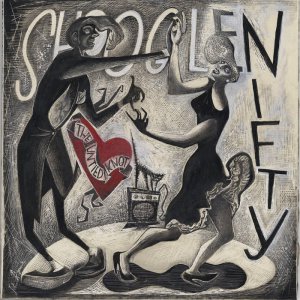 Latitude-wise things do seem to have a
stylistic and rhythmic thread. We've been very fortunate to have made
music with loads of people.
Latitude-wise things do seem to have a
stylistic and rhythmic thread. We've been very fortunate to have made
music with loads of people.
We've been out in Rajasthan at their international folk festival for the last three years and making collaborations. That is an oral, tribal tradition. They aren't 'classical' musicians in that sense but they play the sarangi and the kamaicha which are bowed instruments and we've had some extraordinary moments in rehearsal with these guys where there is no common language other than music and there has been a phenomenal blending.
For example my wife Kaela who sings with the band now, she was singing a Gaelic song and the response from the Rajasthani singer was in a similar mode . . . and then we discovered both songs were virtually identical in their subject matter. Lovely moments like that, and so we are very excited about going back there this autumn.
We are going to try and record an album of the various things we've been collaborating on.
You know Jonny Greenwood from Radiohead has done an excellent album with musicians from Rajasthan?
Yeah, he was out there. I think they were also making a film to. [The guy] who runs the festival over there is really into collaborations and wants to give the tribal musicians a platform so they can stand up and be revered amongst musicians from all around the world. And they are phenomenal musicians. We are learning a helluva lot more from them than they and learn from Scots in terms of rhythm and cadence.
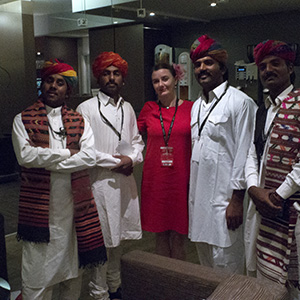 For you as a percussion layer, those
Indian rhythmic patterns are very different. That must be a challenge
for you to learn?
For you as a percussion layer, those
Indian rhythmic patterns are very different. That must be a challenge
for you to learn?
Certainly the intricacies of some of the rhythms are very challenging but the basic grooves are immediately understood and playable. Threes and fours are fine and sometimes you might veer off into a seven, but essentially I can groove along with those guys. In terms of technique, whether it be on the dholak or the tabla, I would have a long way to go to match their dexterity. Although they admire my kick playing!
We play with four guys who are the Master Drummers of Manganiyar drummers of Marwar. They play massive kettle drums, two drummers to a drum. One is playing the bass with his left hand and the other is playing top end of the drum with two very fine sticks, and the bass player is also playing the top end with his right hand. When those guys get going there are incredible waves of rhythms that get established which is impossible for one person to play. I can't see myself reaching that level, but they've been playing since they were five and it's what keeps them alive.
All I can do is look on in awe and admiration . . . there's a bit of them in a video.
I remember seeing large ensemble of those drummers perform once, in a theatrical presentation with the players on different levels.
Yes, the Manganiyar Seduction. Two of these guys were in that show, that is an amazing show. Sadly we wont be bring them with us.
When you come to New Zealand it is just the core band then?
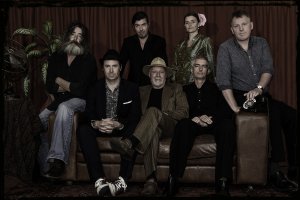 Yes, with Kaela singing this time. We've
only ever been to Australia and New Zealand as an instrumental band
so this will be our first trip with a singer . . . no, she was with
us in Australia last winter . . but this will be our first trip to
New Zealand with songs!
Yes, with Kaela singing this time. We've
only ever been to Australia and New Zealand as an instrumental band
so this will be our first trip with a singer . . . no, she was with
us in Australia last winter . . but this will be our first trip to
New Zealand with songs!
That must have been as innovative to the band to have songs as it was to work with world musicians?
Yes, it is a big learning curve because when you've been going out a six-piece male instrumental group for 25 years then suddenly . . . Kaela has fitted like a glove and was an old friend of everyone in the band, and had sung with us on special occasions previously.
We wanted to keep the energy the band has along with the vocals and are pretty pleased with our first outings.
I image your immediate success might have silenced any critics there might have been at the time, the traditionalists who felt this was somehow diluting or debasing the music? Was there any reservations by some at the time?
I think that all passed a long time ago. I remember one review said, 'Nothing much happens on this album' because we had long sections of just grooves and rhythms. To this day if we go to a very traditional folk festival – for example we went to a festival which is known for its conservatism – and we played an afternoon concert.
The director of the festival who was retiring that year was asking the engineer to turn it down so quiet that the engineer couldn't actually hear the band.
So when we came to play the evening concert we mimed the first number and pretended to play for three minutes . . . then just got stuck in. It was a great gig.
If there had been any of that kind of [concern] I've not been aware of it, we've always had a very strong response from people. In Scotland things have progressed so much over the past couple of decades, although there is still a great respect for the tradition among young people for the all of the musicians who were exploring the possibilities of the music.
That is acknowledged by the conservative people. The scene here is so vibrant it is very hard to find detractors.
This is the musical language which makes the country unique.
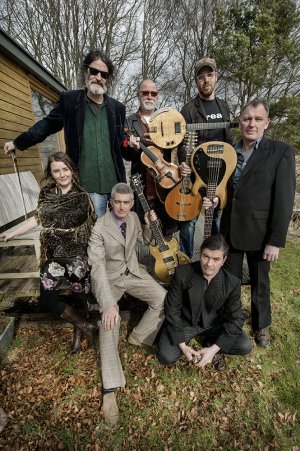 Yes. Sadly we lost Martyn Bennett a few
years ago, but his music was very brave in that he took very
traditional idioms on his last album and sampled sacred Gaelic music,
but did it with great respect. He went to meet the people who did
these recordings and got their permission and they realised his
sincerity and that his love for their music was so strong . . . they
gave him their blessing.
Yes. Sadly we lost Martyn Bennett a few
years ago, but his music was very brave in that he took very
traditional idioms on his last album and sampled sacred Gaelic music,
but did it with great respect. He went to meet the people who did
these recordings and got their permission and they realised his
sincerity and that his love for their music was so strong . . . they
gave him their blessing.
Hamish Henderson the poet describes his music as “a brave new music” and I remember what Martyn said about not pickling your music in aspic, it has to evolve and keep moving along.
That is how you find your way back to the tradition.
The kids who hear us today will learn from us and what influenced us, so we are very much of part of the big rolling wave of it all.
I'm looking forward to seeing you because I've never been in the country when you've played.
Oh, we've done some great gigs in New Zealand. Hopefully there will be no heart attacks in the audience this time. It was in Wellington and we played a speigeltent many moons ago, a gentleman in the crowd collapsed and we had to postpone the gig. He was given resuscitation in front of us and an atropine injection through the chest. He was trying to jump off the stretcher as they carried him out, saying, 'No I'm fine.'
My dad was in a band and he said the first time they ever played when they hit the first note an old lady in the audience keeled over and dropped dead. As I say I'm looking forward to seeing you . . . and as I remind people here, the cross of St Andrew is on the New Zealand flag. There are a lot of Scots in New Zealand.
Oh yes, there is a huge diaspora of Scots around the world, even to the Land of the Long White Cloud.
SHOOGLENIFTY TOUR DATES
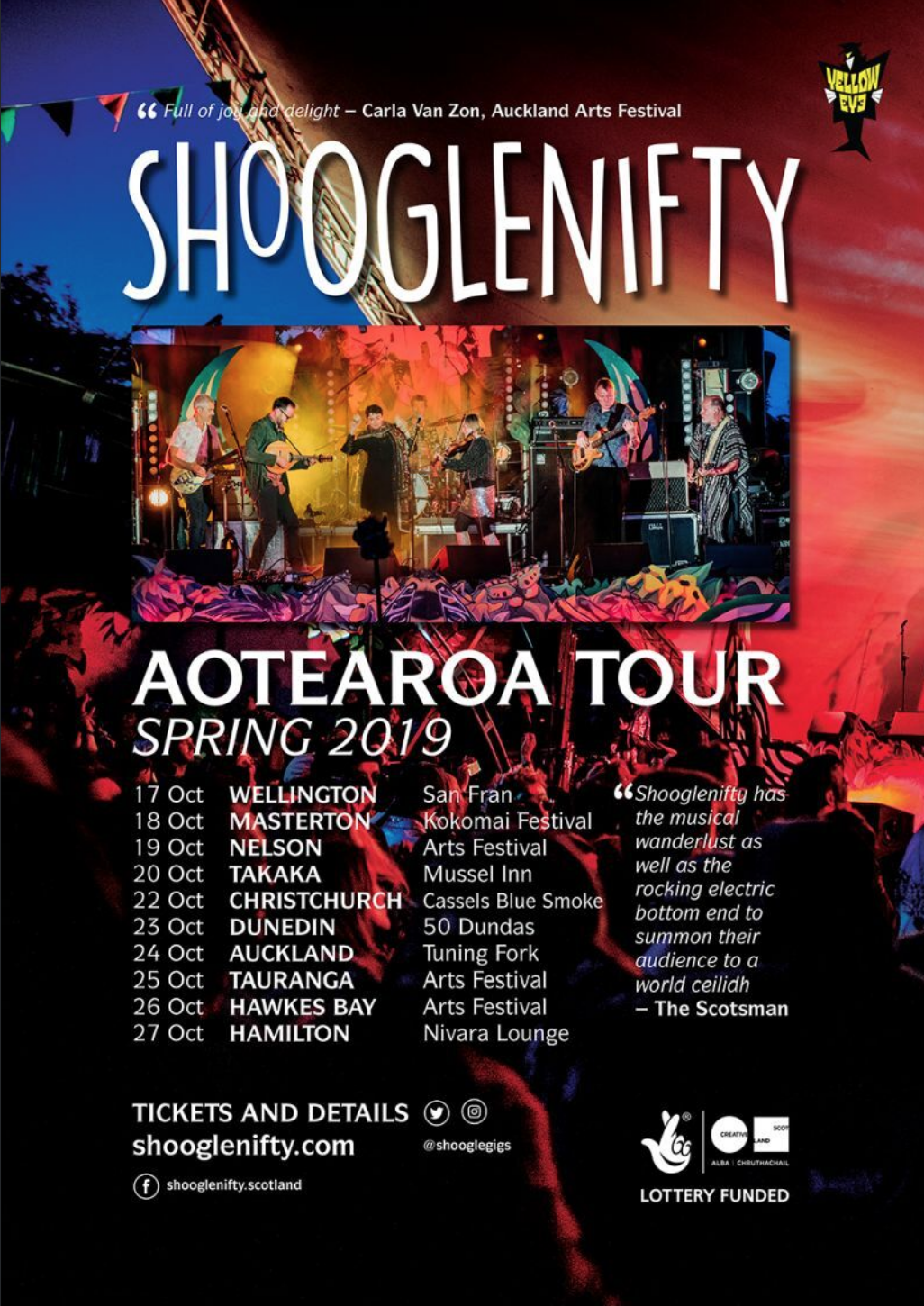


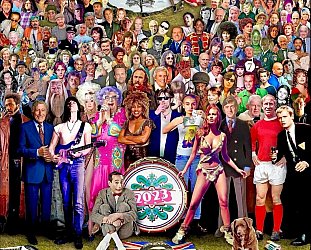
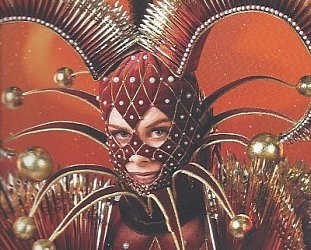

post a comment